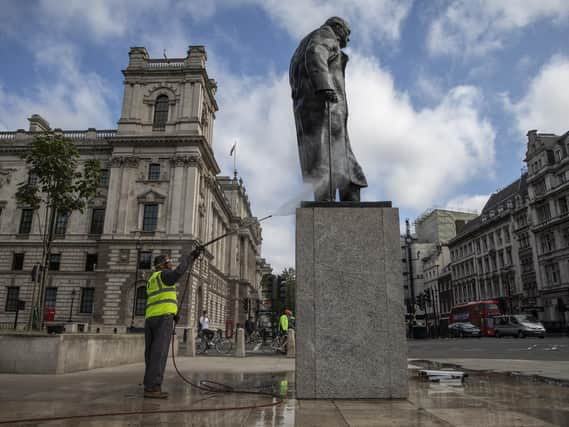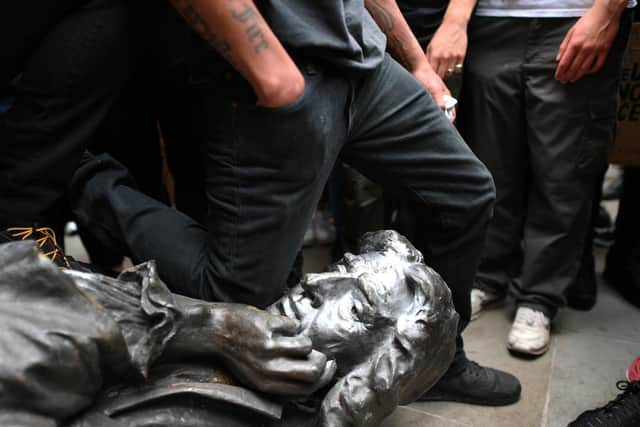Do statues really teach us anything about history?


Visitors to Hull’s train station are greeted by a seven foot tall, bronze Philip Larkin as they step out onto the concourse, while in Leeds’s City Square you will find statues of John Harrison, one of the city’s first wool merchants, and pioneering inventor James Watt who helped put Leeds on the map during the Industrial Revolution, among others.
Britain’s big towns and cities are awash with statues – though there is one less following the toppling in Bristol of a statue of Edward Colston, a 17th century slave trader, which was then unceremoniously dumped in the harbour.
Advertisement
Hide AdAdvertisement
Hide AdFootage of this made headline news around the world and has sparked a war of words on social media.


Many people argue it was a fitting place for a statue of a man who was a member of the Royal African Company, which transported about 80,000 men, women and children from Africa to the Americas. Others felt it was an act of wilful vandalism to a piece of local history.
What it has done is renewed the debate about statues.
Statues are often seen as a homage to influential people from the past. However, someone deemed praiseworthy two hundred years ago perhaps isn’t today.
Dr Dossett also points out that most statues aren’t the result of a democratic public debate. “We’re in danger of seeing statues as these immovable signifiers of the popular will, rather than what they more often signify which is the power of small groups of people to club together to honour one of their own,” she says.
Advertisement
Hide AdAdvertisement
Hide AdAs far back as Greek and Roman times, statues and monuments have been a way of constructing a sense of shared values. “I think statues have always been political and there’s always been the argument that they help us remember and that it would be whitewashing history if you took them away. Equally, people have always tried to suggest that they’re apolitical as a way of keeping particular statues up.
“The debate isn’t a new one, but I think one aspect that is new is the ways in which different groups of people feel empowered and come together to remove them.”
Statues have become contentious in a way they perhaps weren’t even a generation ago. In 2018, plans to erect a statue of Margaret Thatcher opposite the Houses of Parliament were rejected by Westminster Council amid fears it could attract “civil disobedience and vandalism”.
Even a statue of Britain’s wartime leader Winston Churchill isn’t immune after it was defaced again at the weekend, sparking widespread dismay and anger.
Advertisement
Hide AdAdvertisement
Hide AdChurchill is regarded as a national hero, but for those lesser figures whose statues have become a bone of contention in their communities there is the question of whether they should be left where they are, removed, or put in a museum.
Some people are wedded to the idea that statues are part of history and can’t be tinkered with, others that they are relics from a past that is no loner relevant.
There are also those who argue we should erect more statues to reflect different aspects of our history. Though this raises the question of whether large amounts of money could be better spent on campaigns to improve the lives of those who are alive, rather than memorializing the dead.
The debate, it’s fair to say, is far from over.
Editor’s note: first and foremost - and rarely have I written down these words with more sincerity - I hope this finds you well.
Advertisement
Hide AdAdvertisement
Hide AdAlmost certainly you are here because you value the quality and the integrity of the journalism produced by The Yorkshire Post’s journalists - almost all of which live alongside you in Yorkshire, spending the wages they earn with Yorkshire businesses - who last year took this title to the industry watchdog’s Most Trusted Newspaper in Britain accolade.
And that is why I must make an urgent request of you: as advertising revenue declines, your support becomes evermore crucial to the maintenance of the journalistic standards expected of The Yorkshire Post. If you can, safely, please buy a paper or take up a subscription. We want to continue to make you proud of Yorkshire’s National Newspaper but we are going to need your help.
Postal subscription copies can be ordered by calling 0330 4030066 or by emailing [email protected]. Vouchers, to be exchanged at retail sales outlets - our newsagents need you, too - can be subscribed to by contacting subscriptions on 0330 1235950 or by visiting www.localsubsplus.co.uk where you should select The Yorkshire Post from the list of titles available.
If you want to help right now, download our tablet app from the App / Play Stores. Every contribution you make helps to provide this county with the best regional journalism in the country.
Sincerely. Thank you.
James Mitchinson
Editor
Comment Guidelines
National World encourages reader discussion on our stories. User feedback, insights and back-and-forth exchanges add a rich layer of context to reporting. Please review our Community Guidelines before commenting.